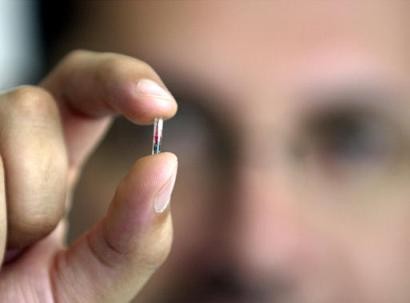Raymond Macquarie of Singularity University in the United States implanted a chip in the left hand tiger's mouth in November 2014. “My experience is great, and I believe that in the near future, human implanted chips will become the trend of the times.†He said at the Big Talk Summit in San Francisco on January 30, 2015. The change that this chip brings to Macquarie is that others can use their mobile phones to scan his business card information and go home without opening the door. The process of implanting this chip is only slightly more painful than wearing earrings. After completion, there will be a bulge of rice grain size, no pain and no feeling. We are in the era of mobile computing, and the era of wearable devices is coming. Now, the era of implantable devices seems to be in full swing. From the philosophical reflection of "man is a machine" to the technical philosophy of "electromechanical/human", the technical reality of "human +" is about to be revealed. Not long ago, "Tengyun" magazine introduced an article from the MIT Science and Technology Review "How Digital Will Revolution". Among them, emerging technologies that will be widely used in two to five years, including quantification of personal life, gesture or expression control computer, biometric authentication identity; emerging technologies that will be widely adopted within five to ten years, have emotional calculations, content analysis, Machine autonomous communication, etc.; brain-computer interface, human enhancement technology, and neural business will be applied after 10 years. Movie "Mechanical Warrior" stills "People +" and human enhancement technology make people move toward "Superman." The reality of the people is limited, first of all the limits of the body. One heart can't be used, one can't be ten-eyed, the eyes can't watch a movie in one minute, and the ear can't listen to a song in one second. The five senses serve as information channels, and their bandwidth lags behind today's transmission technology. The brain acts as a memory and is far less reliable than a hard disk. The physical, physical, and mechanical characteristics of the body are not comparable to most animals. Of course, the biological genetic characteristics of human beings and the desire for longevity and health constitute a huge contrast. In many sci-fi movies, we can see the use of "human augmentation technology". In many cases, the film shows the tragedy brought about by human enhancement technology. For example, people make supercomputers, but in the end they need a man-machine war to regain the right to rule the world; people fully develop intelligence, but perfect and cold wisdom control causes emotions, values ​​and humanity to be expelled and become Non-human, so wait. However, in recent years, science fiction movies have become more and more interested in the future of people becoming "human/machine combination." Owners' emotions, values, and humanity, with the addition of functionally enhanced components, together with the machine partners who stand side by side, defeat the rebellious machine enemies. The high-tech stories told by these sci-fi movies repeat the template of civilized people in modern movies who use the friends of the backward tribes to eliminate tribal rebellions. The South African "Blade Warrior" Oscar Pistorius, who was sentenced to five years in prison for manslaughter and is currently serving his sentence, may be considered a primary tester of "human enhancement technology." At the London Olympics, Pistorius's qualifications have caused controversy. One party hopes to see technology help people with disabilities get rid of restraint and walk, and one party believes that science and technology prosthetics are unfair competition. Focusing on the controversy over whether the disabled person Pistorius can use the prosthetic to compete with normal people, he is anxious about the issues of inspirational, scientific and technological miracles, competitive nature, physical ability and competition fairness. He has already touched the pros and cons of the use of human enhanced technology. Far more profound than the criminal debate initiated by Pistorius whether he really killed his girlfriend. Perhaps, technology will eventually achieve various improvements in human beings, making people more "complete" than nature or what God has given. If people can overcome all the deficiencies of the body, physiology, knowledge, memory, etc., and move away from the limitations of natural evolution, then there is no limit to the future. It will also bring about a revolution in how people understand. "Blade Warrior" Oscar Pistorius Preservation tubes are swabs with disposable virus sampling tubes to collect DNA tests for disposable nasal flocking sterile medical transport. swabs with disposable virus sampling tubes , to collect DNA tests for disposable nasal flocking sterile medical transport. Jiangsu iiLO Biotechnology Co., Ltd. , https://www.sjiilobiotech.com


When you implant a chip in the human body: the confusion of human "superman"
